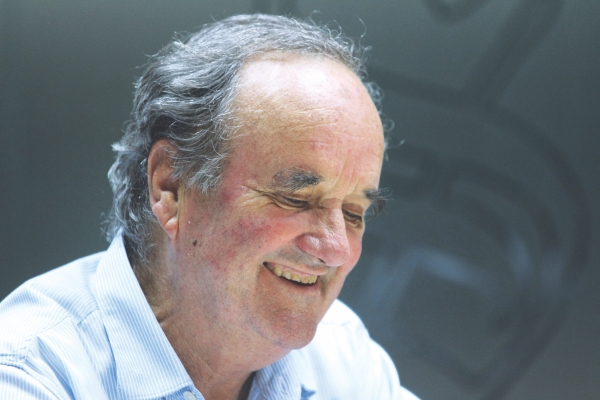| Home - Back Issues - The Team - Contact Us |
 |
| Volume 11 |Issue 19 | May 11, 2012 | |
|
|
Profile
In War and Peace Porimol Palma British journalist Mark Tully is well known not only in Bangladesh, but in South Asia as a whole. Being born in India and spending about 10 years of his childhood there perhaps had something to do with his long love affair with the region later in life. During 30 years of work with the BBC starting from 1964, he covered major events of South Asia, particularly of India. Now he lives in New Delhi as a freelance journalist and broadcaster. For the Bangladeshi people, however, he has a special place as being one of the foreign correspondents who covered the Liberation War in 1971. He has been praised for his objective reporting of the war. It is not surprising therefore, to find him in Dhaka again after so many years. The region obviously has a hold on him. “My mother was born in Akhaura, Bangladesh" says Tully while visiting The Daily Star Centre a few weeks ago. "I was born in Calcutta and spent ten years of my childhood here,” he adds. His grandfather was a jute trader who bought jute from Bangladesh and sold it in Calcutta. Sir Mark studied at Twyford School, Marlborough College and Trinity Hall, Cambridge. After Cambridge, where he studied Theology, he wanted to be a Christian priest, but realised his calling was in a very different world – that of journalism. The time came in 1964 when Tully joined the BBC. He happily chose to work in India, his place of birth, in 1965. He worked as BBC's bureau chief in Delhi for 20 years and decided to remain there even after he quit to become a freelance journalist.
“When I came to India, I felt emotional,” he says. When the liberation war started in the then East Pakistan, Mark Tully was BBC's chief talks writer in London. He used to write commentaries on diplomatic issues. BBC then sent him to India and then to Bangladesh. Tully was one of the few journalists who was allowed to move to Bangladesh around a month after the Pakistani Army started crackdown and established control. “It would be April or May. We were able to travel and interview people in Dhaka. That helped me to understand the situation here,” Mark says. "People here were frightened and did not want to talk. Taking photographs was very difficult. Dhaka turned into a strange city”, he recalls. He wrote many stories that were not necessarily in favour of Bangladesh, but of course, the facts went against the then West Pakistan. “We were not helping you (Bangalis), but doing balanced stories,” Tully said. As Mark went to West Pakistan during the war, he found the authorities there very angry with BBC. They said BBC was exaggerating. "They even termed BBC as 'Bharat Broadcasting Organisation' and 'British Bakwas Corporation'", laughs Tully. He also refers to another British journalist Simon Dring who hid him in Dhaka during the war. Simon Dring and Mark Tully were among those awarded by Bangladesh recently for their outstanding contribution to the liberation war of Bangladesh. During his long career of journalism at the BBC, he covered major events in South Asia. These include Indo-Pakistan conflicts, Bhopal gas tragedy, Operation Blue Star and the subsequent assassination of Indira Gandhi, anti-Sikh riots, Assassination of Rajiv Gandhi and Demolition of Babri Masjid. India recognised his contribution by conferring Tully the Padma Shree in 1992 and the Padma Bhushan in 2005. He was knighted in the New Year Honours 2002. “No Full Stops in India” is one of Mark Tully's best-known books. Other books he co-authored include “Amritsar: Mrs Gandhi's Last Battle, Raj to Rajiv: 40 years of Indian Independence”. Tully's only work of fiction, “The Heart of India”, was published in 1995. Tully later wrote India's Unending Journey and India: “The Road Ahead.” He also wrote An Investigation into “The Lives of Jesus” and “Mother” on Mother Teresa revealing a deeply spiritual side. A fluent Hindi speaker, Tully, who witnessed many of the ups and downs of South Asia, appears to be more of South Asian than British. He wishes for a united and flourishing South Asia that has a strong trade relationship. “I am an advocate of regional cooperation. I want Bangladesh and India to have a proper relationship, not one based on suspicion,” Mark Tully says, adding that India has to have a role for it. “You [Bangladesh] have to do what you can do on your part,” he adds, hoping that the agreements signed between Bangladesh and India during the Manmohan-Hasina summit work out. He thinks India should simply allow whatever Bangladesh wants to sell. On the other hand, Bangladesh should change its atmosphere. “I wish your politics would get less confrontational.” Citing India's example, he said the opposition there accepts the election results, but in Bangladesh it is not the same. "The opposition here does not accept it. If it does, Bangladesh will face less confrontation", he observes. “I want you to build institutions,” Tully comments, putting emphasis on governance. He says he is very loyal to Bangladesh “because it's my mother's birthplace.” Tully went to Akhaura railway junction, the birthplace of his mother. “As the station master saw me, he asked me why I was there. I said it is my office… when I explained to him… he said, laughing. “When you stay in India, you become a great believer in faith. You see life is made for you rather than what you make of it."
|
||||
|

